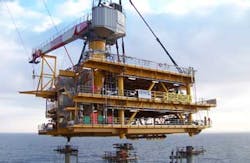German electric utilities company RWE has announced that it is putting an end to its oil and gas exploration activity, in the hope of cutting its debt and capital expenditure, the Financial Times has reported.
Germany's transition from nuclear power to renewable energy, which is reforming the entire European energy market, has also contributed to the decision to call off plans for oil and gas development, it was noted. The Essen company stated that it would sell its oil and gas exploration and production business to raise cash to strengthen its balance sheet. Previously, the company signaled that it was hoping to sell only a part of its exploration business but it has obviously changed its mind.
RWE stated that it was putting up for sale all of its shares in RWE Dea, its exploration and production subsidiary. It is estimated that last year RWE Dea contributed EUR1.8 billion ($2.34 billion) in revenues to the total RWE group sales of EUR53.2 billion ($69.1 billion). Moreover, the company is also looking to dispose of its stake in the Nabucco gas-pipeline project, which is planned to carry gas from the Caspian Sea to central Europe, the Financial Times pointed out.
RELATED: European power stations turn to coal
The company explained that details regarding the move are still being considered but Peter Terium, chief executive of RWE, said that the company's operations need to be focused and optimized, as he expected that the group's revenues would decline after 2013 as a result of the energy policy changes in Germany.
According to industry analysts, finding a buyer for the whole business could prove challenging, because of the varied portfolio of RWE's oil and gas exploration operations. The company has interests in North Africa and Europe, including the North Sea and more specifically its sections belonging to Norway and the UK. However, RWE's interests also reach as far east as Turkmenistan, the Financial Times noted.
The newspaper quoted a London oil banker, who commented that selling the company to one potential buyer was unlikely. While businesses from China and Korea might be interested in the North Sea assets, they would not want to invest in the European onshore ones. Meanwhile, a European company might find RWE Dea's German properties attractive but it is not very likely to be interested in its North African oil and gas operations, he explained.
RWE and its rival, the other biggest German utility Eon, have been under pressure ever since the German government pledged to put an end to all nuclear power plants and closed half of them after the Fukushima disaster in Japan. The rest are scheduled to close down by 2022, as the country is aiming to generate a large proportion of its power from renewable sources. As a result, the two big players on the German market have had to shift their long-term plans to reflect the new reality of the German energy sector. Unlike RWE, Eon has decided to take another route by targeting emerging markets, such as Brazil and Turkey.
